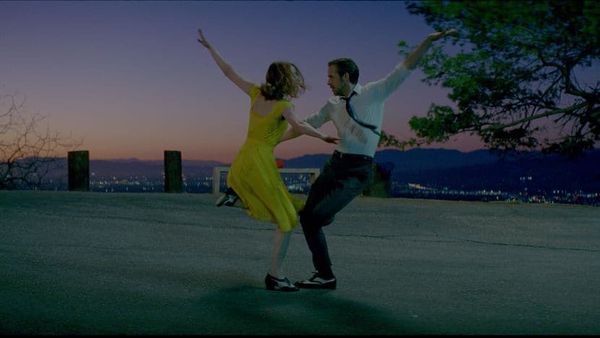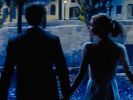Eye For Film >> Movies >> La La Land (2016) Film Review
La La Land
Reviewed by: Owen Van Spall

Remember those bright and breezy Gap ads from Noughties, when a gaggle of impossibly attractive twenty-something SoCal types, decked out in ice cream sundae coloured clothes, danced around a brightly lit set? If you imagine the Ginger Rogers and Fred Astaire romantic musicals from Hollywood’s Golden Age had a baby with those Gap ads, you’d arrive at something close to Whiplash director Damien Chazelle’s Los Angeles-set homage to the song-and-dance screen gems that they just don’t make any more, or at least, make well.
Yes, it is easy to be cynical about a film that seems so perfectly constructed to play on our collective love of nostalgia, and both festival and Oscar committees clear favouritism for films that celebrate the old studio era of filmmaking (see the recent Hail Caesar! and Cafe Society). But Chazelle, teaming with composer Justin Hurwitz, editor Tom Cross, DP Linus Sandgren and the effortless charm machines known as Ryan Gosling and Emma Stone, is not phoning it in here. This film might wear its heart on its sleeve, but it is technically slick, well-acted, and laced with ear-friendly tunes. It is, in short, a proper musical.

Chazelle doesn’t waste any time showing you what he has in store. After a teasing black-and-white opening caption in an art deco-ish font (not that La La Land is set in the 1940s or ‘50s, though it is clearly aiming for a certain romantic timelessness) we are switched suddenly to colour, and dropped right into the middle of a traffic jam on a typical Los Angeles freeway during a sun-drenched afternoon. Hot and bothered, various drivers are shown sitting fuming in their cars, until…things miraculously change. First one driver leaves her car and starts singing, then another and another, until, in one virtuoso unbroken take, we are taken down the traffic line as a crowd of dancing, smiling people take to the road and strut their stuff on top of car roofs and bonnets.
Even at the press screening, this opening ensemble sequence had the audience roaring approval. This kicks the film into high gear immediately and shows us what kind of film to expect: a vividly coloured musical that is set in the present day, but, as with its genre predecessors, this is a reality where people can break into song spontaneously, the world around them stopping for a few precious minutes to let them pour their hearts out in rhyme and dance.
We expect Gosling and Stone to be part of this medley, but they don’t join in this particular number (an irresistible tune called Another Day of Sun, which is so good it feels like it is deployed too soon), as if Chazelle wants to let the rest of the cast have their moment of glory. Gosling and Stone’s characters, Mia and Sebastian, stay in their cars during the traffic jam, before encountering each other in a meet-cute that is more like a meet-crap.
Mia, an aspiring actress stuck waitressing in a Warner Bros. cafe on the studio lot, is so lost in her reading for an audition that she doesn’t notice Seb trying to pull past her in his car, which results in mutual bird flipping. He’s in a foul mood due to a flaw in a section of his latest jazz recording (he’s a jazz pianist with penchant for keeping it old school), which we see him obsessively playing and rewinding on his car stereo. Chazelle, in just a few beats, efficiently tells us all we need to know about these characters. Both are dreamers, both are perfectionists, both are kind of stuck in a rut in a city that is supposed to reward those chasing fantasies. A few other brief touches - Mia’s cracked cellphone screen, Seb’s ratty shirts - round out the picture of them quickly, so we can get to the good stuff.
And that good stuff consists of a series of well-handled musical set pieces that show the evolving relationship between the two over the course of four seasons in LA. It really kicks off after a chance second encounter between the pair, at an evening party in the hilly Mulholland Drive area overlooking the city. A walk back to their cars leads to a swoony, gently funny and disarmingly amateurish song and dance act (Stone and Gosling can’t really sing, but what they can do is move well and look like they are in big-time love), which takes place under the spotlight of a single iron lamp as the bright lights of LA below provide the backdrop. LA is often depicted in movies as a smoggy dump, but Chazelle treats it like the most gorgeous city on the planet, with this and other scenes frequently framed against the most idyllic, evocative-of-a-bygone-era locations. Outside of the charisma of Stone and Gosling, the fine tunes and lush locales, the cinematography also deserves praise: with the camera moving like a lively participant in the fun.
Yes, this is a film dealing in big, heartfelt emotions, with subtlety thrown to the four winds. But, in case you are worried that it all might be a bit too insufferable, Chazelle weaves a disconsolate undercurrent into its emotional core, in such a way that the screenplay feels like it is in fact commenting on the currency it is trading in: nostalgia. Mia wants to be a great actress, the fact she sleeps under a mural of famous Hollywood starlets says it all, but she is barely holding down a day job on a studio lot while juggling auditions for second-rate parts, and the lack of a fast route to success is starting to eat away at her.
Seb is having trouble compromising, too. He is obsessed with the “greats” of jazz so much that he can’t even keep his job at a family restaurant, as he insists on playing freewheeling jazz instead of the stale, cheesy favourites the hard-ass manager demands (played, in a fun cameo, by Whiplash’s JK Simmons). When his old music partner Keith offers him a place on his nu-jazz group’s tour, Seb refuses because they are experimenting, mixing jazz with hop-hop and other genres. But the money he could make on the tour could be the key to finally affording to buy that jazz club he keeps ranting about. The inability of both these lovers to align their current states with the achievements of the dreamers of yesteryear that they grew up hearing about is one of the fault lines in their romance. A full-hearted, brassy final musical sequence makes it clear that, old fashioned and fantastical this film's world maybe, but it is still real enough that achieving your dreams requires a sacrifice here.
Reviewed on: 08 Oct 2016














